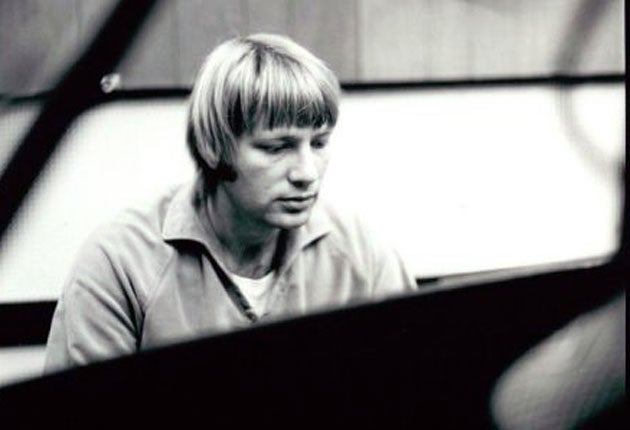Larry Knechtel: Pianist who played with two Elvises, Simon and Garfunkel, Phil Spector and the Doors

Your support helps us to tell the story
From reproductive rights to climate change to Big Tech, The Independent is on the ground when the story is developing. Whether it's investigating the financials of Elon Musk's pro-Trump PAC or producing our latest documentary, 'The A Word', which shines a light on the American women fighting for reproductive rights, we know how important it is to parse out the facts from the messaging.
At such a critical moment in US history, we need reporters on the ground. Your donation allows us to keep sending journalists to speak to both sides of the story.
The Independent is trusted by Americans across the entire political spectrum. And unlike many other quality news outlets, we choose not to lock Americans out of our reporting and analysis with paywalls. We believe quality journalism should be available to everyone, paid for by those who can afford it.
Your support makes all the difference.In 1969, Paul Simon wanted to give his new composition, "Bridge Over Troubled Water", some of the feel of a gospel song. He asked the Los Angeles pianist Larry Knechtel to work on the first verse with the vocalist Art Garfunkel. After four days, he was impressed with the result and the way Knechtel had interpreted his composition. It prompted him to write a third verse, although he subsequently felt that the lyrics were not as strong as the first two. "Bridge Over Troubled Water" became an international best-seller, topping the charts in both Britain and America. Knechtel was invited on tour, and Simon has described how he sat at the side while Garfunkel and Knechtel performed his song. It irked Simon, who admitted, "It's not a very generous thing to think, but I resented it." Knechtel shared a Grammy with Simon and Garfunkel, and the musicians Jimmie Haskell and Ernie Freeman, for the Best Arrangement of the Year.
Coming from Germanic roots, Larry Knechtel was born in Bell, California in 1940 and took piano lessons as a child. He was a gifted musician, being able to sight-read and play by ear. Although he was trained classically, his interest in the black rhythm 'n' blues he heard on the radio steered him towards popular music. In a youth band in Los Angeles he befriended the saxophonist Jim Horn; they were to make hundreds of records together. His first single, at the age of 16, was an instrumental called "Pigeon-Toed". He worked with Kip Tyler and the Flips and made demonstration records for songwriters to give to key performers.
In 1959, Knechtel joined Duane Eddy's band, the Rebels, and they toured the UK on a joint header with Bobby Darin the following year. Knechtel played piano on Eddy's hit recordings "Kommotion" (1960), "Pepe" (1960) and "(Dance With The) Guitar Man" (1962).
By 1962, Knechtel was tiring of the road and wanted to settle in Los Angeles. He became one of Phil Spector's regular musicians, working on several hits and the famed album A Christmas Gift for You (1963). He was also in the house band for the American TV series Shindig!, made by the British producer Jack Good.
The main session musicians (Knechtel, Horn, Hal Blaine, Carol Kaye, Glen Campbell and others) became known as the Wrecking Crew. Knechtel himself, who could also play organ, guitar, bass and harmonica, worked on albums by the Fifth Dimension and the Mamas and the Papas, and was recruited by John Phillips from the Mamas and the Papas to accompany several acts at the Monterey International Pop Festival in 1967. Knechtel played bass on the Byrds' "Mr Tambourine Man" (1965) and several more of their records. He was part of the anonymous band which backed the Monkees on their first album and incensed them as they wanted to play their own instruments.
In 1965, Brian Wilson ceased touring with the Beach Boys and he stayed in California to work on new material. Larry Knechtel was a key musician for the arduous sessions that became Pet Sounds. He played organ on their hit singles "God Only Knows" and "Good Vibrations".
Much of Knechtel's work went uncredited. When the producer Paul Rothchild thought that the Doors did not have a good enough bass player, he recruited Knechtel for their first album, The Doors (1967). Knechtel played bass on Elvis Presley's so-called Comeback Special (1968) and he worked on other Presley sessions. He played on the Everly Brothers' tribute to their upbringing, Roots (1968).
In 1971, Knechtel joined the soft rock band Bread. He played the all-important guitar solo on "The Guitar Man" (1972). Bread broke up acrimoniously in 1977. Knechtel had also worked on selected sessions during that period, including several albums by Paul Simon and Art Garfunkel; his playing on Garfunkel's "I Believe (When I Fall in Love it Will Be Forever)" attempted to capture the magic of "Bridge Over Troubled Water".
With the advent of self-contained groups in the New Wave explosion of the late 1970s, there was less session work. Knechtel moved to Nashville and as well as working on country records, he made the solo albums Urban Gypsy (1990) and Mountain Moods (1991). He worked with Elvis Costello on Mighty Like a Rose (1991) and Kojak Variety (1995), playing a plucked piano on "Remove This Doubt".
In 1995 he bought a ranch in Washington intending to retire, but joined Bread for a reunion tour. He was involved in contemporary albums like Neil Diamond's 12 Songs (2005) and the Dixie Chicks' Taking the Long Way (2006). In 2007, he and other members of the Wrecking Crew were inducted into the Musicians' Hall of Fame.
Spencer Leigh
Lawrence William Knechtel, pianist and guitarist: born Bell, California 4 August 1940; married (one son, one daughter); died Yakima, Washington 20 August 2009.
Join our commenting forum
Join thought-provoking conversations, follow other Independent readers and see their replies
Comments